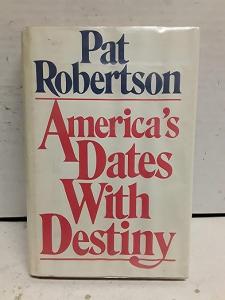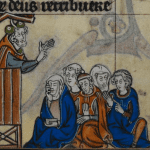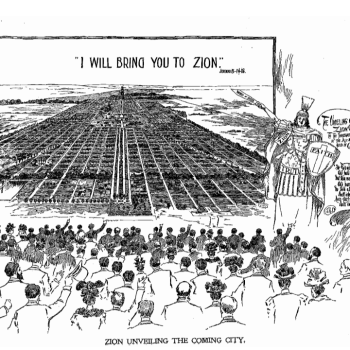A couple of weeks ago, browsing books in a thrift store (one of my favorite decompressing pastimes), I came across an odd book I’d never seen before: Pat Robertson’s America’s Dates with Destiny.
Published by Thomas Nelson in 1986, the book opens with a lament of “revisionist” history (apparently unaware of its own openly revisionary frame!). “Public school students,” Robertson claims, “can go twelve years of elementary and high school and another four years of college without one lesson featuring the central role of Judeo-Christian heritage in the founding and later history of the nation.” American education’s secular, liberal bias had “systematically eliminated” from the record “the religious faith and biblical heritage of our forefathers.” America’s Dates with Destiny, then, endeavors to “correct this imbalance” and offer a history that prizes the “importance of God” and the role of Providence in Robertson’s exceptional America.
America’s Dates reveals this particular historiographical grift has been going a long time. Before David Barton recovered “The Golden Thread” of Providence in American history, Pat Robertson did. These folks have been selectively rediscovering what they want to find for decades.
Like Barton, too, Robertson is not a trained historian. He is however, he points out, a son of Lexington, Virginia, “where the great general Stonewall Jackson is buried” and distantly related on his mother’s side to Winston Churchill and on his father’s side to some Jamestown settlers. So basically the same thing. He did study history as an undergraduate as Washington and Lee, but never received any formal graduate or professional training.
Robertson’s version of United States history comes in the form twenty-three pivotal moments in American history, divided into three sections. Section 1, “Beginning our Journey,” contains “eleven exciting days in early American history when our forefathers clearly demonstrated the early spiritual directions of this nation.” Robertson “rediscovers” something essential in each of these. Section 2 takes a turn. “Losing our Way” details “nine tragic dates…that show how far the nation has wandered from its original goals.” These are moments in which America “lost” something essential. The brief last (quite presentist) section offers a chance for the country to “Find our way” again, predictably through electing conservatives in subsequent elections.
Here’s the full list:
- Beginning Our Journey
April 29, 1607: The Cape Henry Landing, “Rediscovering our Spiritual Heritage”
March 22, 1622: The Massacre at Henrico College: “Rediscovering the Higher Purpose of Education”
July 8, 1741: Jonathan Edwards’ Sermon at Enfield: “Rediscovering the importance of Spiritual Renewal”
July 4, 1776: Declaration of Independence Signed: “Rediscovering God as the Giver of our unalienable rights”
January 19, 1789: The Virginia Declaration of Religious Freedom: “Rediscovering our heritage of religious liberty”
September 17, 1787: Constitution Signed: “Rediscovering the purpose and plan for civil government”
April 30, 1789: George Washington Inaugurated: “Rediscovering the role of personal faith in public policy”
May 14, 1804: Lewis and Clark Begin their Expedition: “Rediscovering respect for the land and the people” *Sidenote: This is the only, even oblique, reference to indigenous Americans
February 3, 1825: Charles Finney’s Sermon at Utica: “Rediscovering the power of spiritual renewal for social change”
November 17, 1863:The Civil War and Lincoln’s Gettysburg Address: “Rediscovering the source of our nation’s unity”
October 28, 1886: Statue of Liberty Dedicated: “Rediscovering the diversity of our heritage”
II: Losing our Way
April 2, 1917: Woodrow Wilson calls for War: “The loss of Old World Dreams and Values”
January 20, 1920: The ACLU Founded: “The loss of the rights of the majority”
October 24, 1929: The Crash and Great Depression: “The loss of fiscal responsibility”
March 4, 1933: Franklin Roosevelt Begins His “Imperial Presidency”:“The loss of power by the people”
September 2, 1945: World War II Ends and the Cold War Begins:“The loss of life and civil liberties around the globe”
November 22, 1963: The Assasination of John F. Kennedy: “The loss of personal rights and safety”
May 22, 1964: Lyndon Johnson’s Great Society Launched: “The loss of a manageable federal budget”
January 22, 1973: Roe v. Wade: “The loss of human rights to America’s unborn children”
April 29, 1975: America Defeated in Vietnam: “The loss of honor and the will to win”
III: Finding Our Way Again
April 29, 1980: A Spiritual March on Washington: “A mandate to return to our Judeo-Christian roots”
January 20, 1981:The Inauguration of Ronald Reagan:“A mandate to return to our conservative roots”
Election Day, 1988: Another Date with Destiny: “A mandate to take our place as responsible citizens in every level of government”
So, there’s a lot here. The framing! The weird interpretations and extrapolations! The oversimplifications! But just a couple for the record: The Civil War (not Reconstruction, which is absent entirely) as an example of unity is…wild. So is imagining the New Deal as a loss of power for ordinary Americans. A “spiritual march on Washington” that is basically totally forgotten makes the cut, but the original March on Washington in 1963 doesn’t? Obviously, the 18th century figures prominently, which is not surprising given the Right’s obsession with the Founding, then and now. The use of heritage over and over is also notable for its resonance in certain circles today.
But in many ways, the omissions are more interesting than the inclusions. The day in 1619 when Africans arrived in Virginia, Robertson’s home state, for one. What about the almost 40 years from 1825-1863? Any important moments in there? The US victory in WWII is also absent, as is Brown v. Board, and the Civil Rights Movement, which apparently didn’t fit the tidy declension part of the narrative.
This oversimplified narrative of forgotten values and steep decline culminates with a mandate to “return” or “take [back]” or reclaim that Judeo-Christian heritage and that once- great country. Sound familiar? It’s telling how long the American Right has been telling a tired story of lost greatness, even in 1988, which now is recalled as a sort of high point for many. Indeed, it’s not dissimilar to modern conservative projects that bemoan American education, intentionally misread history to imagine nostalgic pasts, and offer easy partisan fixes. The solutions Robertson proposed to American decline are incredibly urgent but also woefully inadequate: elections. “Each day becomes a great stage on which the drama of this nation’s Future is being played,” Robertson frantically asserts, before getting to… the 1988 election?
That said, it’s also interesting to mark some shifts within conservatism the book reveals. Robertson’s account certainly privileges white male actors and ignores slavery, race, and civil rights. But it is not overtly racist. Loving v. Virginia isn’t bemoaned, for instance. The Statue of Liberty is celebrated for instituting a diverse heritage. Robertson’s account seems to promote a small-government, fiscally responsible conservatism (that’s de facto white, sure) but not an outwardly xenophobic ethno-nationalist one.
There’s so much more to parse and obviously a lot that’s terrible about America’s Dates and its political project.
But one good thing: I do admire the bold frame and the big argument, off as it is. Many historians, including myself, have tended to write histories featuring wonderful stories and new insights but with more or less safe arguments. This is nothing if not a bold assertion. A real framing of the American story around a big idea over a long time. I’d like to see us as a profession do this more. Take a swing!
Also, I’m curious: what pivotal dates would you pick?














